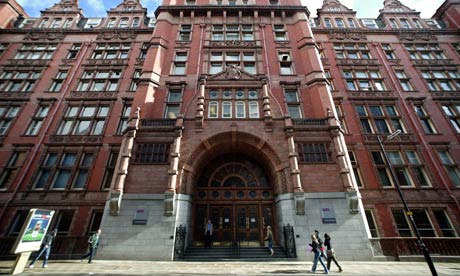Group from London demonstrations take action demanding University of Manchester reveal how cuts will affect their studies

About 40 students entered the John Owens building around 1.45pm. They say they are negotiating with the university authorities.
Jeremy Buck, 22, a student communications officer who is with the students and is speaking on their behalf, said: "The group has decided they want to look at the financial forecasts of the university to see how the cuts will impact on students, staff and departments ... after yesterday's demonstration people felt strongly that we want the momentum to continue."
A student demonstration in London yesterday attracted more than 50,000 people – more than double the number expected by organisers or police. It ended with 50 arrests after about 200 students occupied the Conservative party's headquarters at Millbank in central London. At one stage a protester threw a fire extinguisher off the roof of the seven-storey building. A police leader has said the culprit should be charged with attempted murder.
Buck said the students involved in today's protests had not been involved in the violence at Millbank. They had decided to take action on the coach back from yesterday's demonstration.
"The National Union of Students had first predicted there would be 10,000, then 20,000, and we actually got more than 50,000 people," he said. "It was an amazing experience to see so many students and staff from around the country coming together to oppose what is planned for education and the students here just wanted to do something to continue the momentum."
The students held a meeting at 1pm and 45 minutes later between 40 and 50 people had occupied the corridors of the John Owens building.
"It has been entirely peaceful and no damage has been caused," said Buck. "The university has offered to meet three people to discuss our requests but the students feel that they are a group and want to meet as a group. We are in discussions about this now."
Other students have been prevented from joining the protest and Buck said it was unclear how long the sit-in would last.
Three police vehicles were called to the university at 3.30pm. Among the small group of protesters outside was second-year biology student Robyn Forsythe. He said: "There was a meeting and it was decided that we would occupy the finance office. It is a peaceful demonstration and they are demanding freedom of movement within the university."
The protesters inside could be seen through a stained glass arched window on the first floor.
Joanna Gilmore, a law lecturer and branch rep for the University and College Union, speaking in a personal capacity, said the demonstration was vital to defend education. There had been cuts at the university with staff taking voluntary redundancy, she said.
source

